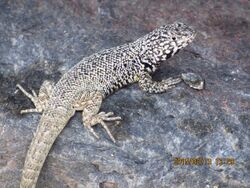Biology:Liolaemus silvai
From HandWiki
Short description: Species of reptille
| Liolaemus silvai | |
|---|---|

| |
| Scientific classification | |
| Domain: | Eukaryota |
| Kingdom: | Animalia |
| Phylum: | Chordata |
| Class: | Reptilia |
| Order: | Squamata |
| Suborder: | Iguania |
| Family: | Liolaemidae |
| Genus: | Liolaemus |
| Species: | L. silvai
|
| Binomial name | |
| Liolaemus silvai Ortiz, 1989
| |
Liolaemus silvai is a species of lizard in the family Liolaemidae. The species is endemic to Chile, with occurrence noted in the Chilean matorral.
Etymology
The specific name, silvai, is in honor of Chilean zoologist Francisco Silva G., who is a professor at the Universidad de Concepción.[2]
Habitat
The preferred natural habitat of L. silvai is shrubland, at altitudes of 140–150 m (460–490 ft).[1]
Appearance
L. silvai have been observed with two main colorings, orange and yellow.[3] Specifically, individuals of the species typically have orange or yellow ventral coloration and black dorsal coloration with no correlation to sex.[4]
Reproduction
References
- ↑ 1.0 1.1 Mella, J.; Nunez, H.; Marambio, Y.; Lobos, G.; Valladares, P. (2016). "Liolaemus silvai". IUCN Red List of Threatened Species 2016: e.T56152769A56152793. doi:10.2305/IUCN.UK.2016-1.RLTS.T56152769A56152793.en. https://www.iucnredlist.org/species/56152769/56152793. Retrieved 20 November 2021.
- ↑ Beolens, Bo; Watkins, Michael; Grayson, Michael (2011). The Eponym Dictionary of Reptiles. Baltimore: Johns Hopkins University Press. xiii + 296 pp. ISBN:978-1-4214-0135-5. (Liolaemus silvai, p. 244).
- ↑ Utsumi, Kaera; Staley, Catherine; Eifler, Maria A.; Núñez, Herman; Eifler, Douglas A. (December 2021). "Color Variation and Habitat Use in Liolaemus silvai". South American Journal of Herpetology 21 (1): 80–84. doi:10.2994/SAJH-D-20-00015.1. ISSN 1808-9798. https://bioone.org/journals/south-american-journal-of-herpetology/volume-21/issue-1/SAJH-D-20-00015.1/Color-Variation-and-Habitat-Use-in-Liolaemus-silvai/10.2994/SAJH-D-20-00015.1.full.
- ↑ Troncoso-Palacios, Jaime; Schulte, James A.; Marambio-Alfaro, Yery; Hiriart, Daniel (August 2015). "Phenotypic Variation, Phylogenetic Position and New Distributional Records for the Poorly Known Liolaemus silvai Ortiz, 1989 (Iguania: Iguanidae: Liolaemini)". South American Journal of Herpetology 10 (2): 71–81. doi:10.2994/SAJH-D-14-00007.1. ISSN 1808-9798. https://bioone.org/journals/south-american-journal-of-herpetology/volume-10/issue-2/SAJH-D-14-00007.1/Phenotypic-Variation-Phylogenetic-Position-and-New-Distributional-Records-for-the/10.2994/SAJH-D-14-00007.1.full.
- ↑ Species Liolaemus silvai at The Reptile Database www.reptile-database.org.
Further reading
- Ortiz JC (1989). "Description de Liolaemus silvai sp nov. (Sauria: Iguanidae) du 'norte Chico' du Chili ". Bulletin du Muséum National d'Histoire Naturelle, Paris, Section A, Zoologie, Biologie et Écologie Animales 11 (1): 247–252. (Liolaemus silvai, new species). (in French).
- Troncoso-Palacios J, Schulte JA II, Marambio-Alfaro Y, Hiriart D (2015). "Phenotypic Variation, Phylogenetic Position and New Distributional Records for the Poorly Known Liolaemus silvai Ortiz, 1989 (Iguania: Iguanidae: Liolaemini)". South American Journal of Herpetology 10 (2): 71–81.
External links
- Hogan, C. Michael, & World Wildlife Fund (2013). Chilean matorral. ed. M.McGinley. Encyclopedia of Earth. National Council for Science and the Environment. Washington DC
- "Liolaemus silvai ". Encyclopedia of Life 2013. Downloaded on 03 Dec 2013. [1]
Wikidata ☰ Q5092453 entry
 |


